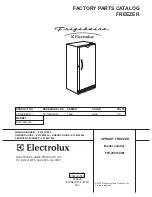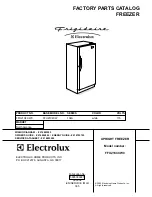
15
Tips for freezing and storing fresh food.
Before freezing, wrap and seal fresh food in:
aluminium foil, cling film, air and water-tight plastic bags,
polythene containers with lids or freezer containers suitable for
freezing fresh food.
Food must be fresh, mature and of prime quality in order to
obtain high quality frozen food.
Fresh vegetables and fruit should preferably be frozen as soon
as they are picked to maintain the full original nutritional value,
consistency, colour and flavour.
Some meat, especially game, should be hung before it is frozen.
Note:
Always leave hot food to cool before placing in the freezer.
Eat fully or partially defrosted foods immediately. Do not
refreeze unless the food is cooked after it has thawed. Once
cooked, the thawed food can be refrozen.
Important:
The table alongside shows the recommended maximum
storage time for frozen fresh foods.
Classification of frozen foods
Put the frozen products into the freezer and classify them.
The storage date should be indicated on the packs, to allow use
within expiry dates.
Advice for storing frozen food
When purchasing frozen food products:
ensure that the packaging is not damaged (frozen food in
damaged packaging may have deteriorated). If the package is
swollen or has damp patches, it may not have been stored under
optimal conditions and defrosting may have already begun.
When shopping, leave frozen food purchases until last and
transport the products in a thermally insulated cool bag.
Once at home, place the frozen foods immediately in the
freezer.
If food has defrosted even partially, do not re-freeze it.
Consume within 24 hours.
Avoid, or reduce temperature variations to the minimum.
Respect the best-before date on the package.
Always observe the storage information on the package.
MONTHS
FOOD
6gb33043.fm Page 15 Monday, May 5, 2003 9:57 AM



























